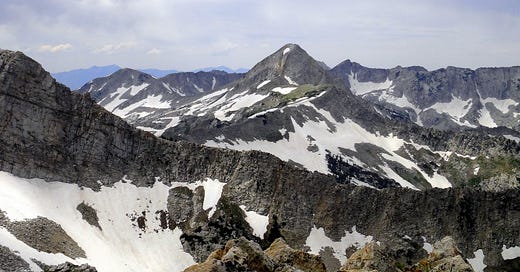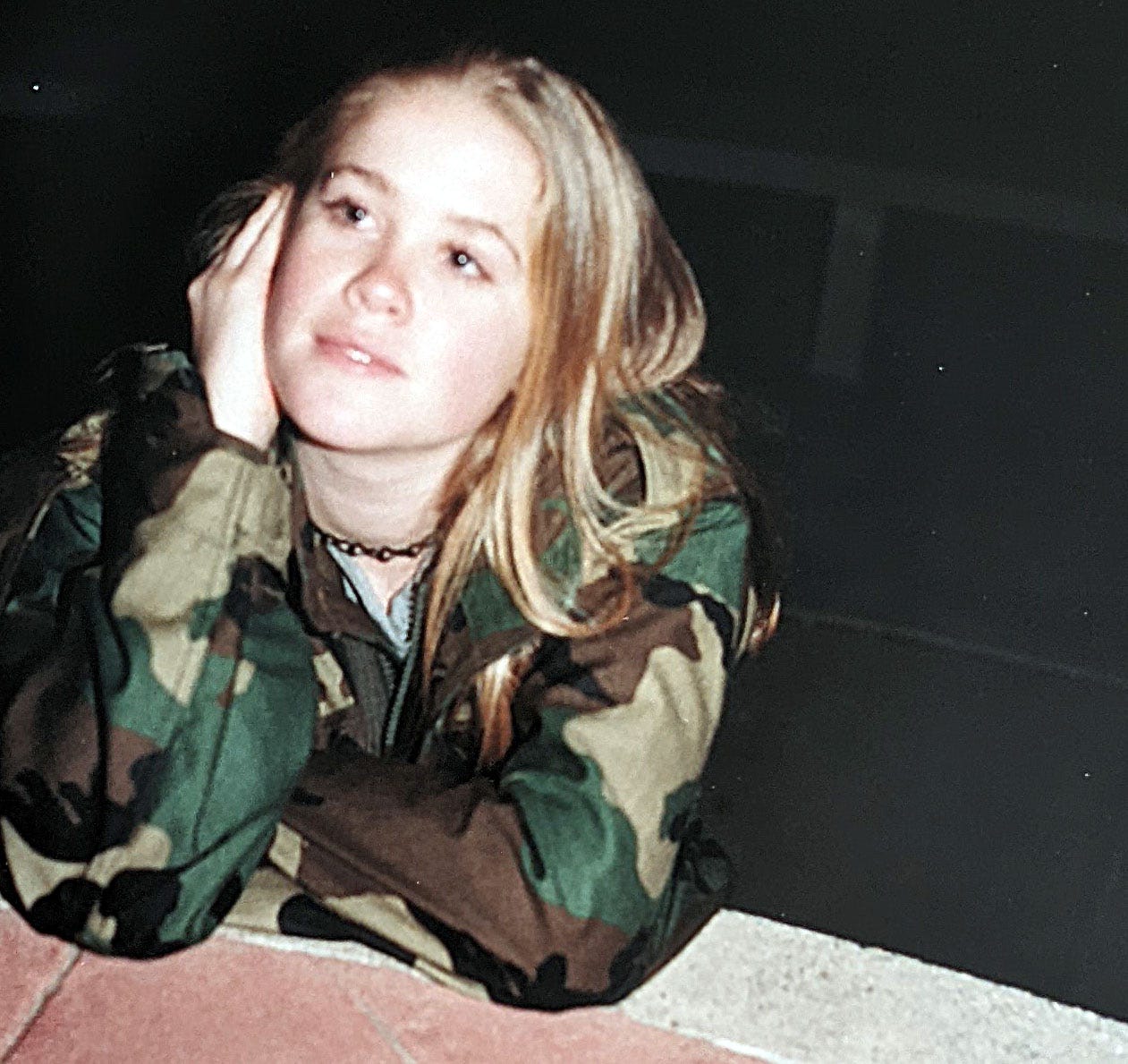For all of my ambitious and sometimes risky outdoor adventures, I don’t think I’ve ever been quite as simultaneously out of control and close to the edge as I was in July 1997 on the south ridge of the Pffieferhorn, an 11,400-foot summit in the Wasatch Mountains. Of course, I didn’t realize this at the time. I was just a dumb teenager, relatively new to mountaineering, and yet brimming with self-assurance and unwavering confidence that only a novice can muster.
He was my first boyfriend, although my 17-year-old self would probably bristle at that description. I met Eric in January while I was working at Albertsons. He was the manager at the video store next door, a few years older than me, and endeared himself by picking me up from school each afternoon in his Saab on his way home from classes at the community college. I spent most of my late teens believing I was hopelessly in love with someone else who didn’t love me back — don’t we all? — but Eric was a wonderful guy, never anything but kind to me, and he was also a lot of fun. We went to hardcore shows, cruised around in his cool car, and shared a mutual passion for the outdoors.
The shared passion was one thing, but sharing actual outdoor experiences often resulted in misadventures. Since we met in the winter, most of our outdoor dates involved snowboarding. Eric was a much more skilled rider than I. Trying to follow him down his preferred black diamond slopes led to spectacular crashes. Now I can only shake my head at what my younger body could handle — hits that doubtlessly would put my 42-year-old body in traction. Once, I caught an edge at top speed and launched full Superman, landing on my stomach with enough forward momentum to kick myself in the back of my head with my board, hard enough that my scalp was bleeding. I do not, nor did I ever possess this kind of flexibility. I could barely get out of bed the next day because my abdominal muscles were so badly torn.
One day in mid-April, while sitting on a lift at Brighton, we made the mistake of celebrating “the last run of the season.” Ten minutes later, Eric hit a patch of ice on the half-pipe and went down hard, breaking his wrist. We were able to scoot the rest of the way down the slope, but his entire left hand had effectively bent sideways. What’s funny is that despite the pain in his broken wrist, he still wouldn’t let me drive his beloved Saab. He piloted himself to the emergency room, stick shift and all. A bright purple arm cast left him out of commission for anything too adventurous for the next few months.
In late June, Eric’s family rented a condo at Snowbird, so we purchased tickets to ride the tram to Hidden Peak. Eric must have only recently shed his cast — it was only 9-10 weeks after his accident — and I was far from an experienced mountaineer. My Dad had only recently introduced me to a few of the higher Wasatch Mountain peaks. The hardest one I’d summited thus far was probably the Pfiefferhorn, a class 2+ climb. And yet I still felt full of confidence when I pointed at the American Fork Twin Peaks, flanked by a razor-sharp ridge, and say, “Oooh, let’s go there!”

In my memory, there was nothing scary about this traverse. The lack of fear is absolutely baffling to me now. How did my adult self become such a wimp about exposure when I used to traverse terrain like this with absolute confidence and no experience? But I think the lack of experience is the key. How could I be afraid of something I didn’t understand? I’d only ever hiked with my Dad. I had perfect trust in him, and by default, perfect trust that hiking in the Wasatch Mountains was safe.
Of course, ignorance doesn’t work for everyone. Unlike me, Eric was terrified. He expressed discomfort early, and his fear became visible when his shoulders began to quake as we shimmied over a granite slab. I remember feeling annoyed. What was his problem? This wasn’t like the Pfiefferhorn where we had to hike 4,000 feet up a steep trail first. The tram did all of the hard work for us.
Eric, I’m sorry I wasn’t more empathetic. Now I understand how you were feeling all too well. I’m impressed with how well you managed your terror to make it all the way to the summit and back.
Eric perhaps didn’t learn from that experience that I shouldn’t be trusted on a mountain adventure, or else he decided to give his immature girlfriend the benefit of the doubt. Either way, when I suggested we hike the Pfifferhorn on July 2, he agreed. My route-finding faltered early and we became lost while navigating through patchy snow below Red Pine Lake. Mostly from Eric’s suggestions about which direction to go, we found our way around the lakes and onto a minor ridge below the summit. We crested the ridge, where Eric got his first good look at the Pfifferhorn. He balked and refused to continue.
“Come on, it’s not so bad,” I urged him. “The knife ridge is short, and then it’s an easy scramble to the top.”
Eric became extremely quiet. He was clearly unhappy, even more so with the scramble up a steep scree-filled couloir than he had been with “the knife.” I sensed that Eric just didn’t share my passion for mountains, and that was okay. He came here to make me happy, but I wouldn’t make him do this again. At the summit, he sat stiffly and didn’t want any of my jellybeans. He remained quiet as we picked our way down the couloir. He audibly exhaled when we finally cleared the knife ridge and started down the minor ridge toward Upper Red Pine Lake. Finally. The hard part was finished.
The bowl beside the ridge was still filled with snow. The steep slope drops directly into Lower Red Pine Lake with a thousand feet of vertical relief. During the winter, it’s popular with backcountry skiers. By early July the snow is rotten, patchy, and littered with exposed boulders — but from afar, it still looks like a fun ski slope. As we picked our way down the ridge, I had a fantastic idea. I took off my pack and pulled out an empty gallon-sized Ziplock bag.
“We can sled down,” I urged Eric. “Cut out a mile of hiking just like that.”
Eric shook his head violently. “It’s called glissading; it’s easy!” I declared. I shimmied down the boulders and stepped onto the snow. I placed the Ziplock onto the snow, turned around, squatted, and …
My butt never even touched the bag. My feet slipped and I launched into a full torpedo, sliding out of control. I was on my back and all I could see was “all sorts of snow and little rocks blasting in my face.” Occasionally dark objects would appear in my peripheral vision, likely boulders. Snowboarding led me to believe that if I could just turn my body sideways, I would skid to a stop. I thrashed and strained until suddenly my body started spinning. Everything seemed to go black. The pinwheel slide was so disorienting that I could no longer determine up from down. I remember feeling a strange sort of peace. Not a certainty that I was going to die — although I didn’t yet have a realistic understanding about how close I was. But I did sense, nonetheless, that I had stepped over the edge. Now there was nothing but the void.
After an eternity, my body stopped spinning and slowed to a stop. I was still on my back, looking up at the sky. My head was reeling; I was so dizzy that I couldn’t immediately sit up. It probably took a few seconds, but when I finally did wobble to a standing position, I turned uphill to find Eric. He was still on the ridge, at least 750 vertical feet higher. He was so far away that I could only see a small silhouette. He seemed to have his arms clasped against his chest, and then he raised them. I raised my arms as well.
“I’m okay! I’m okay!” I yelled. The wind was blowing hard. He didn’t hear me. Nor could I hear him.
I crawled to the rock-strewn ridge to wait for him. The place where I slid to a stop was a rare low-angle ledge. Just a small gravitational nudge toward the center of the bowl, and I likely would have kept sliding all the way to the lakeshore — which, of course, had a rock-strewn runout where most of the snow had already melted. I made a mental note of this without fully understanding it, and started to assess the damage. My elbows were bleeding from dragging them through the snow, but I was otherwise unharmed. A little dizzy and a little shaken, but unharmed. It took Eric at least a half-hour to reach me. By the time he arrived, I was already prepared to laugh about my mishap. He was not. His face was ghostly white. He demanded to look at my head and arms.
“I saw you hit the rocks,” he stammered. “I saw it. There were rocks everywhere and you slid right over them. You were bouncing. I thought I was watching you die.”
“Nope, no rocks,” I said, again holding out my unbroken, mostly unscathed arms.
“I don’t know how you missed them all,” he said, his voice cracking. “That’s a sight I’m not going to forget for a long time.”
Eric’s face remained pale and drawn. His demeanor was stiff, and he spoke little else for the remainder of the hike out. The eerie pitch of his voice when he said those words — “that’s a sight I’m not going to forget for a long time” — echoed in my thoughts. The danger I had so casually courted, and how lucky I’d been, were finally sinking in.
Our relationship would last a few more months — ultimately we drifted apart because of my inertia rather than his. Eric remained gung-ho on going to concerts and movies and even agreed to a few (shorter, easier) hikes. I started classes at the University of Utah and spent much of that fall semester feeling a vague sort of dread about the future — for what reasons, I couldn’t articulate. But looking back, I think I left a portion of my youthful exuberance on that mountain.







After following your adventures for years, is fascinating to hear the backstory, as it were.
Dang